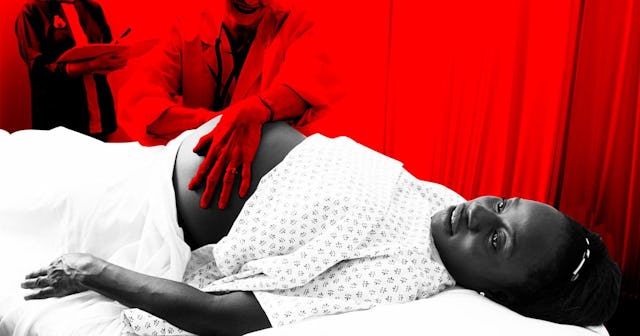The Toll Of Racism Erodes The Health And Wellness Of Black Women

Black mothers are dying at an alarmingly high rate. Black maternal mortality is a result of lackluster pre- and postnatal care, but there is something else contributing to their deaths as well — and that’s the notion that their bodies are already in danger before pregnancy due to something called “weathering.”
What exactly is weathering?
It is the fact that constantly dealing with racism in our day-to-day lives impacts the overall health of black people, especially black women. And as a result of weathering, black mothers are in danger long before pregnancy. When you take the strain of pregnancy on the body and add in the effects of weathering, it can create a dangerous, deadly combination.
We rarely think about the toll racism and anti-blackness take on the body. Being a black person in America means that you’re living with a heightened sense of awareness. For example, microaggressions may seem to do a minimal amount of damage in the moment, but a lifetime of them certainly does matter.
“I coined the term ‘weathering’ as a metaphor to suggest that what I was seeing was both weathering as in the idea of bodies being eroded by their environment, but it also means people being able to withstand that or survive it,” Arline Geronimus, public health researcher and professor at the University of Michigan’s Population Studies Center tells NPR’s Code Switch.
Whether or not people want to admit it, black women are extremely discriminated against in this country. We may try to power through the constant discrimination, but it permeates our lives in ways we don’t even realize, including our physical health.
When it comes to black mothers, we first must look at the ways weathering affects them even before pregnancy. Geronimus mentions a metaphor for weathering given to her by Emerald Snipes-Garner, daughter of Eric Garner and sister to Erica Garner. Erica Garner died of a heart attack at the age of 27. Her heart was enlarged after giving birth to a son three months prior to her death. Snipes-Garner compared the stress of activism and battling racism to the game Jenga. Meaning, you’re taking yourself apart and constantly putting yourself back together.
Courtney Hale/Getty
Black women especially are often playing this game of Jenga with our health. Doctors will dismiss our health concerns, brushing us off. Erica Garner suffered from asthma, combined with her unrelenting work as an activist. Pregnancy does a number on the internal organs, likely compromising her breathing, though we don’t know for sure. This all puts a strain on the heart.
“A black woman is still three to four times as likely to die in pregnancy and childbirth and twice as likely to suffer a life-threatening complication,” Dr. Michael Lu says, in the same story for Code Switch. For years, Lu was head of the Maternal and Child Health Bureau, who are the federal funders for many mother and infant programs.
Lu has done studies that show one of the biggest reasons black mothers suffer from a higher rate of childbirth complications is weathering on the body. And that weathering comes from constant discrimination. What’s more, the high maternal mortality rate for black mothers spans across socio-economic background, education, and class.
Look at Serena Williams, who almost died from childbirth complications. She is the most famous tennis player in the world and incredibly wealthy, but that didn’t matter. If you look at what weathering is and does to the body, it’s no surprise that she had complications. Because of her race, she is often held to higher standards in the tennis world. When she doesn’t lose gracefully, the public tears her apart for not being a good sport, even though her counterparts often do not receive that treatment.
Beyonce has also spoken about the complications she had after giving birth to her twins. Beyonce, arguably one of the biggest celebrities in the world with an enormous net worth, had doctors who didn’t believe her. If these high profile, incredibly wealthy women are facing these kind of challenges, what chance do poor black mothers have?
“It’s the experience of having to work harder than anybody else just to get equal pay and equal respect. Those types of experiences create the kind of chronic stress that continues to gun the engine, which over time create the wear and tear on your body’s systems,” Lu adds.
The pressure of being a black woman in America runs deep. More often than not, we’re not afforded the same graces as our white peers. People are constantly holding us to a higher standard of decorum when moving through the world. Black women aren’t allowed to be anything other than cordial and overly polite, or else we’re branded “angry.”
When we try to advocate for ourselves, people tell us to calm down. Doctors will disregard our health concerns, which definitely has long-term affects on our wellbeing. Geronimus explains that prolonged exposure to high levels of stress hormones makes the body vulnerable. Weathering then increases the body’s likelihood of chronic diseases like hypertension, diabetes, and morbid obesity. All of these are chronic illnesses that regularly plague the black community.
And weathering only does more damage as you get older. Meaning that black women who get pregnant later in life could suffer greatly from childbirth complications, including death. One study conducted by Geronimus mentioned by Code Switch finds that when you look at the chromosomal markers for aging, black women in middle age look more than seven times older than their white counterparts. Seven times. This is not acceptable.
Healthcare professionals must address their biases and take more than a passing glance at the concerns black women bring to them. And while it’s very difficult, black women need to demand a higher standard of care too. Our lives literally depend on it.
This article was originally published on